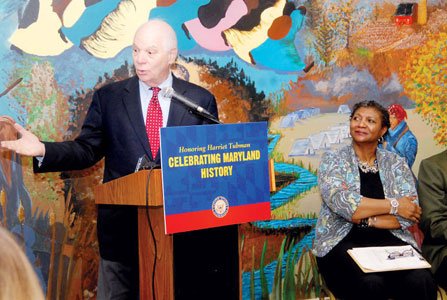Democratic Maryland Senator Ben Cardin says he embraces the old biblical saying of “Out of the mouth of babes.”
In fact, his then nine-year-old granddaughter inspired him to join in efforts to help establish the new Harriet Tubman Underground Railroad National Historic Park in Cambridge, Maryland.
“What got me engaged in this project was my granddaughter had been assigned to do a Black History Month project for her school and she chose Harriet Tubman,” Cardin said. “My granddaughter did a lot of homework on Harriet Tubman and it got me to thinking about this.”
Another Maryland Democratic Senator, Barbara Mikulski, had already begun work to establish the Tubman Park and she introduced legislation in 2008.
Eventually, Mikulski and others including New York Democratic Senator Charles Schumer secured more than $900,000 in federal funds for infrastructure.
Cardin later helped spearhead efforts that eventually led to the state receiving $11 million in grants from various federal agencies toward the establishment of the park.
“I recognized that this was a real opportunity to make a statement,” Cardin said. “I also found out that there is no other national park dedicated to a woman.”
On February 7, 2015, Senator Cardin joined several lawmakers and other officials, including Cambridge Mayor Victoria Jackson-Stanley and officials from the National Park Service, in the celebration of the new Harriet Tubman Underground Railroad National Historic Park.
Descendants of Harriet Tubman were also present at the dedication, including family spokeswoman Patricia Ross Hawkins, who touted the courage and the inspiration that her family has drawn from the life of Tubman, who was born in Dorchester County, where she spent nearly 30 years as a slave.
Born in Dorchester in March 1822, Tubman escaped slavery in 1849 but returned to the area numerous times over the course of 10 years to lead others to freedom.
The famous former slave led many through the Underground Railroad, a network of secret routes and refuges protected by those who were against slavery.
The network helped slaves find their way to freedom in Canada and the Northern states before slavery was abolished.
“This is a great day for the Eastern Shore and our country, as we have the occasion to honor an iconic figure in our nation’s history and do so in a deeply beautiful and symbolic place to visit,” Cardin said of the park’s dedication. “There are few greater examples of bravery; valor and sacrifice about which to teach our future generations, so it is fitting that Harriet Tubman will become the first individual woman to have a national historical park named in her honor.”
Already spread across three counties, the Tubman Park has been afforded the ability to acquire seven other noncontiguous properties that were historically significant in Tubman’s life, according to Cardin.
The park will consist of 2,775 acres in Dorchester County, 2,200 in Caroline County and 775 in Talbot County.
The parcel in Dorchester County contains the home site of Jacob Jackson, a free African-American man who communicated with Tubman’s family members and allowed his house to be used as one of the first safe houses on the Underground Railroad leading out of the Eastern Shore.
Along with the park system in Maryland, a park has been established in Auburn, New York, the town where Tubman died in 1913, that includes Tubman’s house, a home for the elderly that has been named for her, a nearby church and Fort Hill Cemetery, where she is buried.
“What’s great too is that the president had already declared this a national monument and it has the historic park designation,” Cardin said.
“For Tubman, the Eastern Shore is home and her remarkable story of liberation speaks of skills born of hardship, her love of family, her strength of spirit, all of which have their roots here,” said Michael Caldwell, Regional Director of the National Park Service.
“The establishment of the National Historical Park raises Tubman’s story to the level of recognition befitting one of our nation’s heroes; a woman who was internationally renowned,” Caldwell said. “The National Park Service is eager to continue our work with U.S. Fish and Wildlife Service, the State of Maryland, local officials and partners to make Tubman’s extraordinary story better known and understood throughout the nation.”
